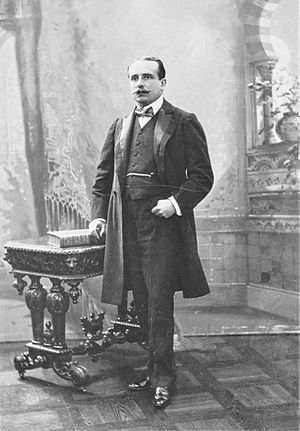José Pardo y Barreda facts for kids
Quick facts for kids
José Pardo
|
|
|---|---|
 |
|
| 35th President of Peru | |
| In office September 24, 1904 – September 24, 1908 |
|
| Vice President | José Salvador Cavero Ovalle Serapio Calderón |
| Preceded by | Serapio Calderón |
| Succeeded by | Augusto B. Leguía |
| 39th President of Peru | |
| In office August 18, 1915 – July 4, 1919 |
|
| Vice President | Ricardo Bentín Sánchez Melitón Carvajal |
| Preceded by | Oscar Benavides |
| Succeeded by | Augusto B. Leguía |
| Prime Minister of Peru | |
| In office September 8, 1903 – August 1, 1904 |
|
| President | Manuel Candamo |
| Preceded by | Eugenio Larrabure y Unanue |
| Succeeded by | Alberto Elmore Fernández de Córdoba |
| Personal details | |
| Born |
José Simón Pardo y Barreda
24 February 1864 Lima, Peru |
| Died | 3 August 1947 (aged 83) Lima, Peru |
| Political party | Civilista Party |
| Occupation | Politician |
| Signature | |
José Simón Pardo y Barreda (born February 24, 1864 – died August 3, 1947) was a Peruvian politician. He served as the President of Peru two times. His first term was from 1904 to 1908. His second term was from 1915 to 1919.
Contents
José Pardo: A Peruvian President
Early Life and Family
José Pardo was born in Lima, Peru. His father was Manuel Justo Pardo y Lavalle. Manuel Pardo was important because he was the first president of Peru who was not from the military. He also started the Civilista Party. José Pardo followed in his father's footsteps. His grandfather, Felipe Pardo y Aliaga, was also a famous diplomat and writer. He served as a minister and vice president.
Becoming President
José Pardo became the leader of the Civilista Party. Before becoming president, he worked as the Foreign Minister. This job involves dealing with other countries. He then became the Prime Minister from 1903 to 1904. This happened under President Manuel Candamo.
After President Candamo passed away, Serapio Calderón became the temporary president. New elections were called. José Pardo was chosen as the candidate for the Civilista Party. Another party, the Democratic Party, had Nicolás de Piérola as their candidate. However, Piérola decided to leave the election early. This meant José Pardo was elected president. Both of his times as president focused on liberal ideas. This means he supported more freedom and progress.
Improving Education in Peru
One of José Pardo's main goals was to make education better for everyone in Peru. Before his time, local towns were in charge of elementary education. This was based on a law from 1876, which his father had suggested. José Pardo wanted to fix problems with this system.
In 1905, a new law was passed. This law changed the education system. It made the central government responsible for education. It also said that primary education should be free for all children. It was also made compulsory, meaning children had to attend. This was especially important in small villages and mining areas. The law also said that any place with more than 200 people should have a small school.
Pardo also created special schools to train teachers. The Escuela Normal de Varones was for male teachers. The Escuela Normal de Mujeres was for female teachers. He also set up a General Branch of Instruction. This group had inspectors who checked on schools across the country.
Supporting Culture and Learning
José Pardo also helped to establish many cultural places. These included the National Academy of History. He also created the School of Fine Arts (Bellas Artes). The National Academy of Music was also founded during his time. And the National Museum of History was established. He also started the Superior Combat School. This school helped train high-ranking military officers.
Second Term and Later Life
José Pardo's second time as president started in 1915. During this period, the world was dealing with World War I. Peru felt the effects of this big war. There was also a lot of activity from workers. They were asking for an "8-hour workday." This meant they wanted to work only eight hours a day. This important change was finally approved on January 15, 1919.
Just before his second term ended, he was removed from power. This happened in a sudden change of government led by Augusto B. Leguía. José Pardo then lived in France for eleven years. He later returned to Lima, Peru. He passed away there in 1947.
José Pardo married his cousin, Carmen Heeren Barreda, in 1900. They had seven children together.
See also
 In Spanish: José Pardo y Barreda para niños
In Spanish: José Pardo y Barreda para niños
- Politics of Peru
- List of presidents of Peru
 | Percy Lavon Julian |
 | Katherine Johnson |
 | George Washington Carver |
 | Annie Easley |

